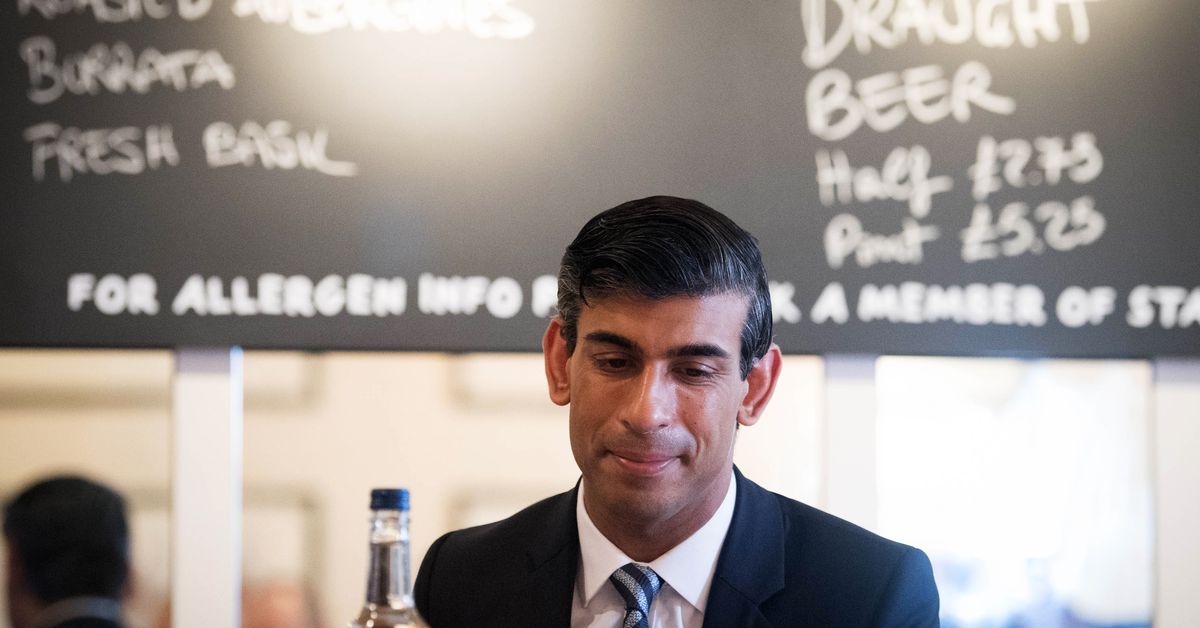The chief executive of the most powerful hospitality trade body in the U.K. has claimed that restaurant, bar, cafe, and pub workers and owners owe former Chancellor of the Exchequer Rishi Sunak “gratitude” for the fiscal relief packages introduced during the COVID-19 pandemic, despite their numerous flaws.
Kate Nicholls said that “there are many thousands of hospitality businesses and millions of workers in the sector who owe @RishiSunak and his Treasury team a huge debt of gratitude for the help and support provided over the last 2 years” on 5 July, in response to his resignation from Boris Johnson’s government.
There is no doubt that absent the packages of business rate relief, loans, and cuts in VAT, and the job support provided through various iterations of the furlough scheme, the already deleterious impact of COVID-19 on restaurants and their workers would have been even worse. Chancellor Rishi Sunak’s approach to financial management did not include — as much as many in the sector might disagree — not caring about restaurants. The hundreds of millions spent on “Eat Out to Help Out,” the epidemiological wisdom of that policy notwithstanding, are testament to the Treasury’s understanding of the significance of hospitality to economic recovery. He introduced grants for restaurants in tier two, despite their being able to open.
There is plenty of doubt, however, over the extent to which those workers should feel “gratitude” towards a Chancellor plunged into an unprecedented and fast-moving economic maelstrom. Economically protecting people was, ultimately, his job, and the way he did it was not always satisfactory, or even sensible.
The furlough scheme never accounted for service charge, even though cross-party groups of MPs repeatedly said it should. This meant for many hospitality workers, the vaunted 80 percent of wages offered ended up being like 60, 50, or even just 40 percent: an amount of money insufficient to pay rent, buy food, and live. When restaurants needed grants, thanks to either unexpected surges or, worse, the government’s own, conflicting rules, they often never arrived or were comically insufficient. Even business rate reductions, which several restaurateurs have credited as vital to survival, if not longevity, were hampered by parameters that simply missed out huge numbers of small independent establishments and failed to account for larger premises in city centres.
But more than any individual decision taken, Sunak’s ideological tussle with Boris Johnson over civil liberties, economic growth, and epidemiological management was one of the biggest contributing factors to the patchwork of nonsensical measures imposed on the hospitality world between spring 2020 and summer 2021.
Delays to extending the furlough scheme and the short-lived plan for the Job Support Scheme left businesses forced to make cuts because there was no clarity on what was coming. Caveated opening procedures based around “substantial meals” provided an illusion of freedom while in fact restricting trade, with no support to compensate for that restriction — because businesses could be open. Both the prime minister and the chancellor sought to have restrictions both ways, refusing to fully close down businesses because that would mean providing more meaningful financial support, while preaching liberty in allowing “trade” limited by curfews, rigmarole, and an unhealthy obsession with the ontology of Scotch eggs.
Perhaps no-one initiative typifies this more than Eat Out to Help Out. It served up over 100 million meals, brought people into restaurants, and claims it was a serious contributing factor to the spread of COVID-19 have remained unsubstantiated.
But it also caused chaos for staff who had been away from work for months on insufficient wages, pushed restaurant capacity and logistics to breaking point, and did nothing to solve the long-term accumulation of rent debt that would build up during the course of COVID-19 restrictions. It was a perfect PR stunt for the by-then “Dishy Rishi,” and a Conservative government seeking to portray itself as restoring free-flowing freedom to a nation reeling from death, grief, and pain that occurred on its watch. But for the restaurants and workers it purported to help, it did little in the long-term.
That will be Sunak’s legacy as Chancellor in the hospitality world: a glossy ally to business leaders and big sweary chefs, willing to put his money where his mouth was only when it was guaranteed to give him political credit in the bank, not when it would most help the people who would receive it. After his tenure in political office, which has ended in a staged moral epiphany that has arrived when it will benefit him most, many restaurants saddled by debts will close: slowly and painfully, crumbling under a weight that Sunak, with different policymaking, could have more alleviated. That might not have saved them. But they would have been grateful that, at least, he tried.
